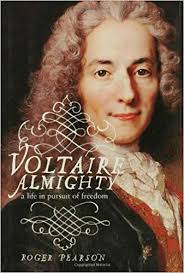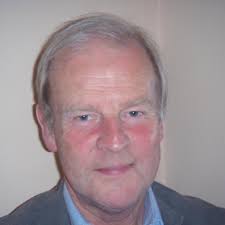Voltaire Almighty: A Life in Pursuit of Freedom (2005) by Roger Pearson.
GoodReads meta-data is 384 pages, rated 3.86 by 140 litizens.
Genre: Biography

Verdict: As irreverent as the man himself.
No one can say nothing about Voltaire (1694-1778), good or bad, that he did not say himself. Everything about the man was fiction, starting with his name, and that is a fact. Born François-Marie Arouet he later took the name we know him by, and PhDs since have tried to figure out why he needed a nom de plume since he bragged no end about what he wrote, and why that name and not something grander, say, like Almighty.
The obvious answers do not lead to tenure: He wanted to be different so he made up his own name. And why that one? He was a wilful brat, the youngest and last child, much indulged, and called, as a result, le petit volontaire. Translate it this way: petit means small, of course, and volontaire means will, so the little wilful one, i.e., brat. See: volontaire becomes Voltaire by striking out the middle letters ‘on.’ Instead the PhDs have become anagramalogists and offer a host of convoluted reasoning to arrive at tenure via the obscure. Occasionally he ennobled himself with a ‘de’ in front of Voltaire. This jeu has likewise kindled a blaze of academic gibberish.
From this start he became, like an air-headed celebrity today on morning television, famous for being fatuous. Many people today will recognise the name but be unable — I have asked a few on trains bound for Wynyard — to name any of his accomplishments. Start here: he published about ten million words in every literary form, plays, poems, odes, essays, novels, history, and science in two thousand pamphlets, plays, histories, novels, essays, and books. In addition he conducted empirical scientific research into optics, chemistry, and more. Put that in the Research Quality Framework! Then there are the letters, thousands of them, most composed to last.
All of this in an age of control through censorship that a modern McKinsey manager can only dream of. He was twice convicted of naughtiness and did porridge for eleven months the first time. That lesson was learned. The second time he arranged for a bribe, er, a Florida campaign donation to the jailer. On other occasions when the McKinsey managers of the day were intent on KPI-ing him he found it best to absent himself to the countryside where few Parisians ventured, and then to England and Switzerland. Then there were at least two beatings he suffered, arranged by people who felt offended by his words. It is all theatrical enough to make Orson Welles jealous.
How’s this for a story. When he needed money, on the advice of a mathematician, he borrowed money to buy enough tickets in a state lottery to win a packet while paying back the loan and to be rich thereafter. He used this wealth to claim his father’s inheritance which had been tied up in Jarndyce vs Jarndyce. Again a well-placed campaign contribution to the Florida attorney-general freed up his inheritance and he was set for life. Others might then have retired to the bottom of a bottle, or to an estate to kill defenceless creatures. Not so for Voltaire who went for bigger game that could fight back and did – mainly the corrupt Church. He also thereafter remained a lifelong investor and an avid follower of financial news.
He liked to claim at dinner parties, offering many details, that he had been sexually abused as an altar boy. (Is such a thing possible in the age of Enlightenment, one asks, putting down the newspaper.) This experience, he went on to say, explained all of his failings, and none of his successes. Noel Coward was a bore in comparison.
He admired the intellectual freedom and social atmosphere in the Netherlands and later in England, but hated the weather and the food in those northern reaches. Chief of his inspirations were William Shakespeare and Isaac Newton. Some say that the story of the apple falling on Newtown started with Voltaire’s quill.
He often published books anonymously or with pseudonyms to escape the wraith of royal and ecclesiastical censors. Let’s remember how serious that is: The royal censor had an axe and the ecclesiastical censor had a bonfire.
Thereafter some printers would blackmail him with threats of exposure unless he paid up! That was bad. What was stupid was that he could not help but brag about these anonymous publications in letters which blew his cover. What a windbag he was. Though there seems to be no evidence that he reviewed his own pseudonymous works as Anthony Burgess did. That is a trick he missed, one of few.
Polymath he was and spent weeks and many francs doing experiments in physics the better to understand Newtown so as to explain him to Francophones in the baleful grip of René Descartes’s metaphysics.
This frail and anaemic looking man never lacked for energy or wit. While often ill and always complaining of bad health he could never sit still, not even for painting and sculpture to immortalise him. He grew wealthy with his endless negotiations and investments, and at about sixty, persona non grata from France, Prussia, Saxony, Austria, and elsewhere he took up residence in the semi-autonomous canton of Gex across the lake from Geneva to continue his war on ignorance and corruption central, namely the Church.
He was free; he was rich; he was old; he could say what he wanted without trying duck and cover. He let loose with a barrage of invective, took up lost causes of individual victims of the Church, besieged officialdom in five countries with petitions and letters. An avalanche of pamphlets, plays, essays ridiculing, admonishing, mocking the high and mighty came forth. More than once he double-tracked: dictating one essay to a secretary, while with quill in hand he was writing another.
He was a Euro celebrity and the world came to him. He held court with hundreds come to catch a glimpse of him. To handle the crowd and to give the locals a show, he hired a dozen retired dragoons as an honour guard and decked them out in silk and ermine. He invested heavily in watchmaking and gave clocks to anyone and everyone to develop a market. He even gave one to the Pope, which was accepted, much to his delight, since it was made by a Huguenot protestant. That somewhere in the interstices of the Vatican time was regulated by a protestant technology amused him no end, and of course he could not keep this to himself so he spread the word, which eventually got to Rome and the clock came back. That amused him even more. The Church giving back loot rather than taking it, as it usually did.
As an aged, valetudinarian, ectomorph, celebrity he bought property and was a fearsome negotiator. Vendors liked the idea of selling to this celebrity, so he first beat the best price down, then quibbled about the timing and currency of payments, then wanted complicated buyback provisions, and more. At first he did this to ensure that his de facto wife would have a cash settlement if and when he died before the descent of distant relatives, blackmailing printers, tax famers, Church vultures, and other shysters. But then she died, and he kept doing it as sport. He outlived most of the people who agreed to his terms and got richer and richer. Yet he argued the margin with publishers, pursued plagiarised editions with vigour, and pinched every sou, while spending freely.
He likewise negotiated with the local priest, bishop, and archbishop the terms under which Easter would be celebrated in Gex, and he was so persistent, dogged, and slick that he always got his way though in one instance Easter was delayed while he pressed his case. God had to wait for Voltaire! He loved that.
Like Thomas Jefferson he was a deist, that is, one who believed god, an intelligent being, made the world. It was then up to us to make the most of it. This deity did not expect to be worshipped and did not intervene in the world. The Church that promoted those beliefs was an elaborate hoax to control the unwary to the benefit of the Pat Robertson wannabes. Jefferson’s deism is ignored by all those small government types who quote him, yet it is there on the walls of the memorial in DC for those that have eyes to read.
While he combatted the Inquisition at every turn, seeing it to be the logical conclusion of The Roman Catholic Church, he was an incorrigible and unpleasant anti-semite.
While he and Jean-Jacques Rousseau were contemporaries with Volatire the senior who encouraged the young Rousseau, but…. There are several ‘buts.’ Though they cohabited in Paris and later in Geneva, but never met face-to-face. Voltaire criticised some of Rousseau’s essays and the thin-skinned Rousseau bristled and never forgave or forgot. (Check out Jacq’s autobiographical Confessions, which surely take a prize for pettiness.)
In heady early days of the French Revolution its leaders legitimated themselves by gathering to Paris its intellectual precedents. Huh? Yes, well, they dug up Rousseau and Voltaire and installed them in the Panthéon. They have since been across the aisle from each other. I rather think whoever did that got the joke. The Panthéon was one the first places I went to on my first visit to Paris, and there they were, and still are.

I had no ambition to read a biography of Voltaire but the stars aligned to direct me to it, and I — weak reed that I am — bent. When harvesting titles from tripfiction.com for our 2019 sojourn in Mitteleuropa links led me from Austria to Switzerland (because I have found virtually no interesting krimis set in the land of cuckoo clock I looked*). One of the titles listed there was ‘A Visit from Voltaire’ by Dinah Lee Küng (2004). I asked for a sample (and will get to it). And once I did that the Amazon mechanical Turk spat out other suggestions, including this title.
Earlier in the week when dog walking we encountered Rousseau the poodle whose predecessor, we recalled, was Voltaire. See the alignment of the stars is apparent in retrospect. It’s that kind of neighbourhood.
All of this was confirmed on our travels when I noticed a picture of Voltaire in the reception lobby of the hotel in Venice, though I forgot to ask why it was there. Still it meant Voltaire expected me to do the homework.
*Before the pedants strike, let me add I have read Friedrich Dürrenmatt, but his stories are generic, not rooted in Switzerland, and Friedrich Glauser of whom the less said, the better. I started Tracee de Hahn’s ‘Swiss Vendetta’ but how can I read anything written by a Tracee? ‘Night Train to Lisbon’ starts in Zurich but, well, the train left. Maybe it was Geneva, and that is the point. The origin was just a rainy day anywhere.
